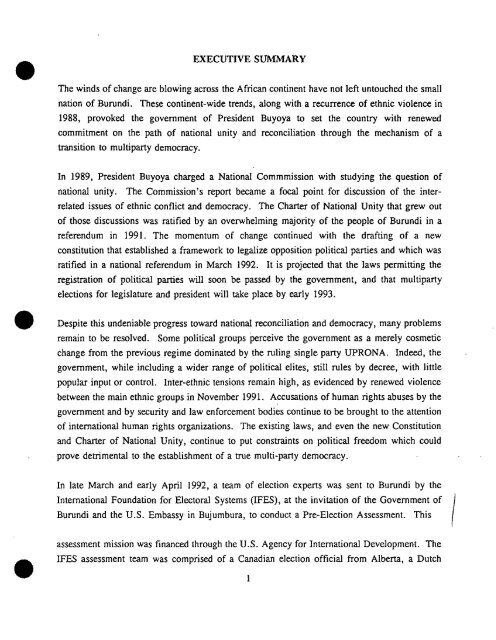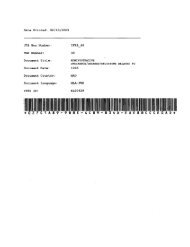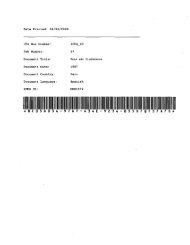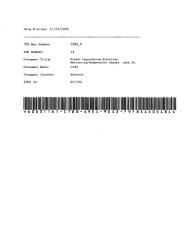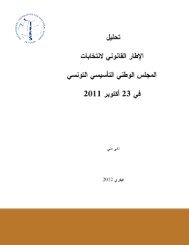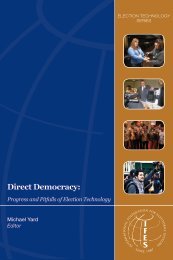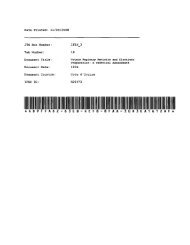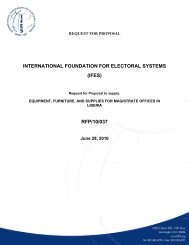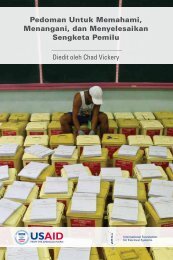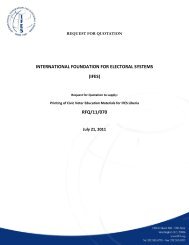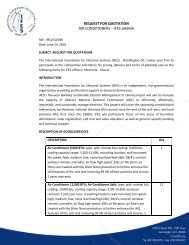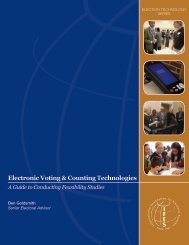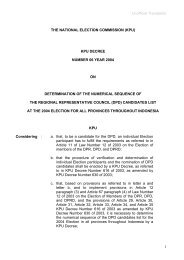- Page 1 and 2: Date Printed: 11/03/2008JTS Box Num
- Page 4 and 5: •TABLE OF CONTENTSEXECUTIVE SUMMA
- Page 8 and 9: IFES Pre-electionAssessmentBurundip
- Page 10 and 11: IFES Pre-electionAssessment: Burund
- Page 12 and 13: I. INTRODUCTIONProject InitiationTh
- Page 14 and 15: ll. THE FRAMEWORK OF DEMOCRACY IN B
- Page 16 and 17: ' .. -"IFES Pre-electionAssessment:
- Page 18 and 19: IFES Pre-electionAssessment:Burundi
- Page 20 and 21: IFES Pre-electionAssessment: Burund
- Page 22 and 23: IFES Pre-electionAssessment:Burundi
- Page 24 and 25: IFES Pre-electionAssessment: Burund
- Page 26 and 27: IFES Pre-electionAssessmentBurundiT
- Page 28 and 29: IFES Pre-eJectionAssessment: Burund
- Page 30 and 31: IFES Pre-electionAssessment:Burundi
- Page 32 and 33: v. HUMAN RIGHTS AND REFUGEESThe gov
- Page 34 and 35: VI. CIVIL AND POLITICAL INSTITUTION
- Page 36 and 37: IFES Pre-electionAssessment: Burund
- Page 38 and 39: IFES Pre-electionAssessment: Burund
- Page 40 and 41: IFES Pre-electionAssessment: Burund
- Page 42 and 43: IFES Pre-electionAssessment:Burundi
- Page 44 and 45: vrn. REQUEST FOR ASSISTANCEA reques
- Page 46 and 47: IFES Pre-electionAssessment:Burundi
- Page 48 and 49: IFES Pre-electionAssessment:Burundi
- Page 50 and 51: IFES Pre-electionAssessment: Burund
- Page 52 and 53: APPENDICES
- Page 54 and 55: Appendix A:Team Description."
- Page 56 and 57:
OUELLET. Guerin (Gary)21 Bell Cresc
- Page 58 and 59:
•••
- Page 60 and 61:
CONTRIBUTORS -PEOPLEAAAAADELSKI, El
- Page 62 and 63:
· -.'..::~~::.fNYANDWI, Simon*OUEL
- Page 64 and 65:
Appendix C:Excerpts from the Rappon
- Page 66 and 67:
22Deuxieme chapitreEXPERIENCE DEHOC
- Page 68 and 69:
24Nonobstant le rOle regulateur jou
- Page 70 and 71:
26Sur Ie plan insti tutionnel, une
- Page 72 and 73:
•,5t ,28p~eges dans lesquels les
- Page 74 and 75:
38La corruption des Alecteurs peut
- Page 76 and 77:
117Une reforme sera envisagee notam
- Page 78 and 79:
119Dans nombre de communes, cette d
- Page 80 and 81:
121C' est pourquoi la Commission Co
- Page 82 and 83:
1232. Le Conseil CommunalParmi ses
- Page 84 and 85:
125L'Assemblee communale peut egale
- Page 86 and 87:
Appendix D:The Constitution of Buru
- Page 88 and 89:
REPUBLIQUE DUBURUNDICABINET VU P'R
- Page 90 and 91:
Kubera ko twemeza ko mu mige~dera
- Page 92 and 93:
Il)gingo ya 5Article 5U:nurv.:a mUK
- Page 94 and 95:
Ingingo ya 13Ubuzi~a b~lu~untu wese
- Page 96 and 97:
' ...:','~b;...'iriz'Wa :1i ryo !"'
- Page 98 and 99:
.. :..•.. ~1ngingo ya 29Urnur~ndi
- Page 100 and 101:
~a mu buzirna bwi~e no mu~atungo yi
- Page 102 and 103:
~~u~tu wese yononye i~unga:--y'igih
- Page 104 and 105:
Mu . bisab~a kugira ngo imiga:;:b~'
- Page 106 and 107:
lngingo ya 62Article 62." .~.. 'Mw'
- Page 108 and 109:
Abo bashingantahe n'abapfa~c~i b2
- Page 110 and 111:
Ingingo ya 72Umukuru w'igihugu ni w
- Page 112 and 113:
:'".'2:;2:;::" ~2.:'C;'ba :;'E.:£
- Page 114 and 115:
Uwusubirira UmukurG ~'Igihugumu kir
- Page 116 and 117:
.Ararongora Inama NShikiranganjiabi
- Page 118 and 119:
,gihano kugira~1,.;i,:oza.ngo yemei
- Page 120 and 121:
~i~we na rimwe, urnushinga~atekaatu
- Page 123 and 124:
eanns• Gushinga ukuge!le inzegoz
- Page 125 and 126:
kingana n'ikiringo lnamaNshingamate
- Page 127 and 128:
slngingo ya 123Imirwi y'abashingama
- Page 129 and 130:
.11 I "'.Ingingo ya 129 Article 129
- Page 131 and 132:
JeeenJIngingo ya 135Amaze guhanuza
- Page 133 and 134:
2.r:n)-Ingingo ya 141Intahe ya Se
- Page 135 and 136:
Ingingo ya 148Ibwirizwa ni ryo rito
- Page 137 and 138:
. . ...:.e•lSesju~rje,=rJeon:SJe,
- Page 139 and 140:
• 'Ingingo ya 1592bwiri=~a ~~ ~yo
- Page 141 and 142:
, I:eIngingo ya 165lnama Nkuru j I
- Page 143 and 144:
'.- r. ;;. .. ... ~ __ ~a t.c=ra :2
- Page 145 and 146:
IejiWI igi ~ugu 2Danje gU:'2rll':Za
- Page 147:
Ingingo ya 187Article 187el I ,Iyo
- Page 150 and 151:
,;RAPPORT. DE LA COlVIMISSION. '.NA
- Page 152 and 153:
13" Ii .•, ;;. !: pI' , :": I 'I'
- Page 154 and 155:
" ;." .-, ". - .,~.Avant -propos 16
- Page 156 and 157:
Avallt ·propos 2021Avant ·proposN
- Page 158 and 159:
•••
- Page 160 and 161:
REPUBLIQUE DU BURUNDICOMMISSION NAT
- Page 162 and 163:
2ont seme ·1 d haine, la suspicion
- Page 164 and 165:
4Le peuple burundais a'ccuse une ho
- Page 166 and 167:
6,consol ider; Aussi prenons-nous l
- Page 168 and 169:
Nous reaffirmons que Ie8merite, la
- Page 170 and 171:
la sauvergarder pour tous10et pour
- Page 172 and 173:
.. '.I 12C'est 1 ui qui di?termine
- Page 174 and 175:
14ses besoins et a ceu!': de sa fam
- Page 176 and 177:
ARRETONS QUE CETTE CHARTE EST UNPAC
- Page 178 and 179:
Appendix G:Discours du President de
- Page 180 and 181:
Monsieur le Premier Ministre,;". ;M
- Page 182 and 183:
- 3 -! ..11 s'agissait en suite d'o
- Page 184 and 185:
- 5 -11 est 'et reste le Gouverneir
- Page 186 and 187:
•••
- Page 188 and 189:
Uf>lWAKA WA 23 N° 6/84198423· ANN
- Page 190 and 191:
SOn de .. ·oir de citoyen el "'-Ot
- Page 192 and 193:
BoD.B. II' 6/1l4e''T':,--,0'preci~(
- Page 194 and 195:
.. w'o'leCloraux, Ie respect des pr
- Page 196 and 197:
.)L.a pcjne de ~nitude ~naJc vi)ee
- Page 198 and 199:
•\".;Oa.ns Ie cas vi~e au sec.onc
- Page 200 and 201:
. ",IW' .I1•!•.\-\IiI1Stellon 2
- Page 202 and 203:
-,~I,blie un iablctl.u fainnt rCSSO
- Page 204 and 205:
-'.,. .• tifiution. q Approu"u"vo
- Page 206 and 207:
2Article 3 :L'enrolement des electe
- Page 208 and 209:
DE UCLOTURE DU VOTE ET DU DEPOUlu.D
- Page 210 and 211:
DE DDlOULE,r£NT Ill' DE CLO'l'tl!1
- Page 212 and 213:
L'an mil neu:f' cant quatr~ douze l
- Page 214 and 215:
Jm!tIIrJ,'1' DU SCROrIl~. on avoir
- Page 216 and 217:
Article 3L'enrolement des electeurs
- Page 218 and 219:
.'Article16Le President du bureau d
- Page 220 and 221:
24. Depouillement au scrutin.esuiva
- Page 222 and 223:
_________________________e""RESUl T
- Page 224 and 225:
•Appendix I:Avam-projel de Loi su
- Page 226 and 227:
Vu I' arret· de la Cour Consli tut
- Page 228 and 229:
Article' 9 'Nonobstant les disposit
- Page 230 and 231:
Article 2~Les partis politiques doi
- Page 232 and 233:
Les principes de base ell'ideologie
- Page 234 and 235:
Article 36Le formation politique. I
- Page 236 and 237:
Article 50Le montant des cotisation
- Page 238 and 239:
Article 58Tout parti pol i tique do
- Page 240 and 241:
Article 65Quiconque enfreint les di
- Page 242 and 243:
Ti tre IXDES DISPOSITIONSTRANSITOIR
- Page 244 and 245:
•••
- Page 246 and 247:
...... I'I" :"LA PRSSSS ~.UEURlnWIL
- Page 248 and 249:
C:~:t ~ d,.:s ':G:::'l::"~cs q-...:
- Page 250 and 251:
LJ!"Sq"J.:2' 1c c:2.:7I.~d::u!"'!"'
- Page 252 and 253:
J:'s 1..:- c?.dr~ l:O S2S fcncti)!:
- Page 254 and 255:
]3 : So:: t .:-.bro0ees tOUt2S disp
- Page 256 and 257:
Appendix K:Burundi Government Assis
- Page 258 and 259:
les i:-:.:e:--'/e:-:'2.:1:s ~·a;le
- Page 260:
~au~~ait ~a~te~ ~ l'esp~it que corn


